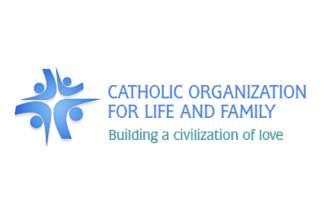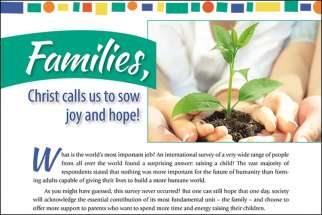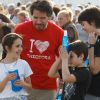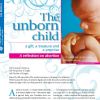Bishops launch new family office
OTTAWA -- A new organization focused on supporting families within the Catholic Church in Canada is now up and running.
COLF to be replaced by new life and family office
OTTAWA – Michel MacDonald already feels he has the right messages. The task now is making the most of the mediums that can deliver the messages.
COLF launches palliative care campaign
OTTAWA - The Catholic Organization for Life and Family (COLF) launched its national palliative care campaign Oct. 3 with the support of Canada’s Catholic bishops.
Families encouraged to promote life, peace and love
OTTAWA - The Catholic Organization for Life and Family (COLF) is urging families to live up to a vocation of promoting life, peace and a culture of love.
OTTAWA - The Canadian Organization for Life and Family (COLF) is urging Catholics to “speak up” as the Ontario College of Physicians and Surgeons reviews is policy on conscience rights.
COLF exhorts families to engage in new evangelization
OTTAWA - To mark the Synod on New Evangelization taking place in Rome Oct. 7-28 and the beginning of the Year of Faith, the Catholic Organization for Life and Family (COLF) has released a leaflet urging families to spread the Good News.
In “The Gospel of Everyday Life: an Adventure Worth Sharing,” COLF explains the role of the family as a domestic Church as well as that of lay faithful in evangelizing in light of the teachings of the Second Vatican Council and Scripture.
For decades, Catholic Church leaders have been calling for the new evangelization — “new in its ardour, new in its methods and means of expression” because “too many of the baptized live as if God does not exist,” COLF says.
“Their way of life, their opinions, their choices are aligned with an atheistic or relativistic vision of life.”
Not only baptized Catholics need to hear “Christ spoken of seriously” but so do those “with whom we rub shoulders at work, school or university, in the shopping mall, the subway or bus, in our leisure and volunteer activities."
Woven throughout with quotes from Pope John Paul II and Pope Benedict XVI, the leaflet urges people to collaborate with Christ in introducing Him to family members, friends and others.
The leaflet suggests a gentle, humble approach rather than aggressive proselytizing or imposing one’s faith on others. COLF invites Catholics to deepen their personal relationship with Jesus Christ through prayer, study of the faith and more frequent participation in the Eucharist and the sacrament of Reconciliation.
COLF focuses on Jesus the Son of God, laying out the Gospel message in a way that makes it easy to share with others. Invite Catholics who have fallen away to come back to Church, and invite others to “come and see” and be prepared for when a friend might ask, “What must I do?” to know Christ.
Evangelization is not just for priests, bishops and those in religious life, COLF insists, but is part of the call of all the baptized. It’s also the call of families as domestic churches, the leaflet says.
“God is counting on us, as parents, to make our children apostles of the new evangelization,” it says. “Whoever speaks of evangelization is obviously speaking about relationships, because we must enter into relationship with another person to be able to share with him or her the secret of our happiness.
“By nature, we are relational beings, because we are created in the image of God — Father, Son and Holy Spirit, eternally in relationship,” COLF says.
Evangelization, especially in the family, is not composed of “great speeches or theoretical lessons but through everyday love, simplicity and daily witness.”
The leaflet has a section entitled “Riddle time!” that has a question and answer format that is easy to share with children. It also includes a page with discussion questions for adults that would be appropriate for small group discussion.
The document is downloadable from Colf's web site at www.colf.ca. A workshop guide is also available.
Canadian census figures show 'devastating' decline in traditional family
OTTAWA - Canada's latest census figures showing a continued decline in married-couple families and a hefty rise in lone-parent and common-law arrangements are “sad and worrisome” and “nothing to celebrate,” say pro-family organizations.
Peter Murphy, assistant director of the Catholic Organization for Life and Family (COLF), said the “handwriting is on the wall” as the 2011 census reveals the number of common-law couples has risen 13.9 per cent since 2006 and lone-parent families have increased by eight per cent. The number of children living with married parents declined from 68.4 per cent to 63.6 per cent from 2006 to 2011, Statistics Canada reported in a Sept. 19 release of data on family structures. But when the figures are examined over 50 years, the picture shows a dramatic decline from around 90 per cent of married couple families in 1961. A steep decline began in the mid-1970s.
“Despite an attempt by the media to make ‘diversity’ in family structure seem like a good in itself, when it comes to questions pertaining to procreation and child-rearing the ‘writing’ is inscribed on the human body,” Murphy said in an e-mail interview. “It takes a man and a woman to conceive a child and, as the social sciences have told us repeatedly, it is in the best interest of children to be raised by a man and a woman united in marriage.
“Study after study has found that the advantaged child is the one raised by one woman and one man in a stable, committed relationship,” he said. “This is because God, our creator, has made the union of man and woman fruitful and this fruitfulness is not limited to physical procreation.”
The Institute of Marriage and Family Canada (IMFC) warned the family related data outlines an “alarming trend” that will lead to greater child poverty. IMFC research and communications manager Andrea Mrozek said she was disturbed by the “chirpy” response to the troubling data in the mainstream news media.
Mrozek said the IMFC has shown in its research that family breakdown is linked to poverty — citing the 2006 census which showed 8.2 per cent of married couples were in poverty, according to the Low Income Cut Off (LICO), compared with 16 per cent of lone-parent families headed by men and 32.2 per cent of lone-parent families headed by women.
The media seemed to be applauding the growth of more diverse, progressive family circumstances, she said. The coverage was “superficial” and misses the real story of demographic and family decline that is “devastating” for Canada as a country and for every individual touched by family breakdown, said Mrozek.
Most social science research in the United States has acknowledged that the married couple raising children biologically related to them is the best for children on a range of outcomes from poverty levels to drug or alcohol abuse, trouble with the law, mental health, early sexual activity and future success at maintaining stable marriages themselves, Mrozek points out. This message has not reached most policy advisors in Canada.
COLF agrees the research shows married-couple families raising children biologically related to them have the best outcomes.
“The social cost of equating ‘alternative’ parenting relationships with the traditional family has already had a profoundly negative impact on society,” Murphy said. “To begin with, children raised in non-traditional family structures are statistically more vulnerable to abuse and to developmental and social problems of various kinds. Both the children themselves and society in general end up paying a high price.”
Like Mrozek, Murphy shares concerns Canada’s aging population and dwindling number of working taxpayers make the cost of family breakdown “increasingly difficult to bear.”
“Not surprisingly, in such circumstances, some are already pushing for euthanasia,” he said. “If we are serious about wanting to forestall further societal damage, we need to embrace God’s vision for human sexuality and the human family — the vision so beautifully articulated by Blessed John Paul II in his Theology of the Body.
“Healthy families make for healthy citizens,” he said. “At every level of society, we need to make support for the traditional family a priority.”
OTTAWA - The Catholic Organization for Life and Family (COLF) warns Canada is veering in a "dangerous direction" towards euthanasia and assisted suicide and urges Catholics to enter the public debate on end-of-life care.
"It is impossible to remain silent following the June 15 decision by Justice Lynn Smith of the Supreme Court of British Columbia in the Carter case," said COLF director Michèle Boulva in a July 4 release. "As citizens of a country which claims to be civilized, Catholics and all people of good will have the right and duty to counter any attempt to legalize euthanasia and assisted suicide, and also to promote palliative care and true compassion."
COLF calls for reopening of abortion debate
OTTAWA - The Catholic Organization of Life and Family (COLF) has called the status quo on abortion “intolerable” and calls not only for “legislative reform” but also a “great cultural renewal.”
In its latest publication, “The Unborn Child: a gift, a treasure and a promise,” COLF describes respect for life as a “gauge of civilization” and warns that when the right to life is not fully protected “other rights are sooner or later mocked.”
It points out that in Canada there is no legal protection for the unborn child.
OTTAWA - Society’s changing attitudes towards gender and sexuality are creating serious problems, primarily for children, a psychoanalyst priest warned the Catholic Organization for Life and Family (COLF) at its annual seminar.
“We need a social revolution,” said Msgr. Tony Anatrella, a psychoanalyst and specialist in social psychiatry based in Paris.
Speaking to about 110 people on the theme “Men and Women, Spouses and Parents: Forming Christian Citizens,” Anatrella said one of the pillars of civilization — objective recognition of sexual difference — is disappearing. Instead, it is being replaced by radical notions of sexual orientation that are based on gender theories developed in the 1950s.
Viewing marriage with a theological lens
OTTAWA - Amid challenges Catholics are facing in the area of marriage and human sexuality, the Catholic Organization for Life and Family (COLF) gave John Paul II’s teachings on the Theology of the Body (TOB) top billing at its third “Seminar on the Family.”
Catholic weddings have decreased 74 per cent in Canada over the past 34 years. The picture is similar in the United States and other Western countries, said Christian and Christine Meert, directors of the office of marriage and family life in the Colorado Springs diocese.
Among Catholics who choose a church wedding, 90 per cent of engaged couples are already sexually active, using artificial contraception and planning to continue using it after marriage, the couple said. They said Catholic priests and marriage preparation leaders may be reluctant to bring up the Church’s teachings on human sexuality for fear of scaring away young people.
Quebec bishops, COLF oppose euthanasia recommendation
OTTAWA - Quebec’s Catholic bishops and the Catholic Organization for Life and Family (COLF) have expressed opposition to a Quebec committee’s recommendation to allow euthanasia under limited circumstances.
“While we are pleased that members of the commission recommend greater access to palliative care for all people, we disagree with the recommendations to change laws to recognize physician-assisted dying as appropriate end-of-life care,” the Assembly of Catholic Bishops of Quebec said in a statement. “Changing the terms ‘assisted suicide’ and ‘euthanasia’ to ‘physician-assisted dying’ does not change reality.”
Feticide shows need to reopen abortion debate
OTTAWA - An editorial in the Canadian Medical Association Journal warning of a distortion of the male/female balance due to sex-selection abortion in some ethnic communities shows the need to reopen the abortion debate in Canada, say pro-life groups.
In the editorial, Journal interim editor-in-chief Dr. Rajendra Kale urged the sex of a fetus be kept from pregnant women until 30 weeks gestation, when it is unlikely an abortion will be performed except for exceptional medical reasons.
“Female feticide happens in India and China by the millions, but it also happens in North America in numbers large enough to distort the male-to-female ratio in some ethnic groups,” said Kale.
MP wants Parliamentary debate on when life begins
OTTAWA - Though the Prime Minister has repeatedly said his government will not allow the abortion debate to reopen, an Ontario Conservative MP said he is not worried about the risk as he contemplates bringing forth a private members’ bill on the matter.
“I’m pretty comfortable as a Member of Parliament raising this issue, because it is an issue with such human rights implications,” said Stephen Woodworth of Kitchener, Ont. “It should be everyone’s priorities to ensure that any law that involves fundamental human rights is informed by modern, medically accurate evidence, not some 400-year-old arbitrary legal argument.”
















